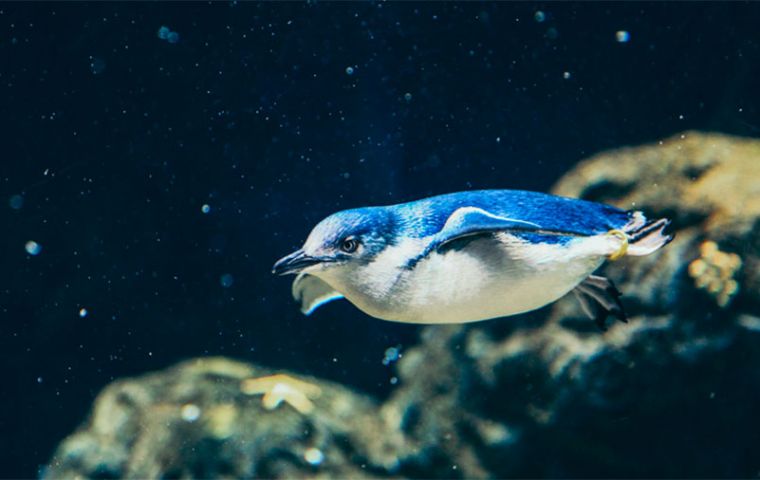MercoPress. South Atlantic News Agency
New Zealand korora penguins dying because of climate change with food more difficult to reach
 As water temperatures rise, the small fish the birds eat have been swimming deeper in search of cooler waters
As water temperatures rise, the small fish the birds eat have been swimming deeper in search of cooler waters Small bodies of hundreds of penguins have washed ashore on the northernmost coasts of New Zealand, and although their deaths were at first a mystery, researchers now think they understand why the kororā, or little blue penguins are dying.
Charlotte Cook reporting for Radio New Zealand, says climate change is likely responsible for the deaths of more than 500 penguins since May with numbers of dying birds continuing to climb. As water temperatures rise, the small fish the birds eat have been swimming deeper in search of cooler waters. And though kororā are skilled divers—their genus name Eudyptula means “good little diver”—they’re best suited for shallow waters and can only plunge 65 to 100 feet below the surface of the Pacific.
With their main source of food now out of reach, the penguins are losing weight and, eventually, they’re either starving to death or succumbing to hypothermia because they don’t have enough blubber to stay warm.
“They’re just skin and bones,” Graeme Taylor, a seabird scientist with the New Zealand Department of Conservation, tells Radio New Zealand. “They’ve got no fat on their body. They need that insulation of the fat layer to keep them warm. And they haven’t got that [and] they haven’t got much muscle tissue on them.”
New Zealand scientists at first suspected that the birds might be dying from exposure to toxins in the environment or some sort of heretofore unknown disease. But after performing necropsies on the little penguins, they determined they were about half their normal weight.
“When they get to that stage of emaciation, they can’t dive,” Taylor explains.
Kororā (pronounced as its spelled, with emphasis on the final syllable) are the world’s smallest penguin. Native to New Zealand, the birds are easy to spot out in the water and in sheltered inlets. They typically only come ashore at night to tend to their nests, which they make in underground burrows and between rocks. During mating season in May and June, the noisy birds can be heard around dusk. Aside from small shoal fish, kororā also eat squid and small crustaceans when they can get them.
Their numbers have been declining in recent years, primarily because of human development. Previously common on mainland New Zealand, now kororā are mostly found on outlying islands where there’s less disturbance. Today, the New Zealand government classifies them as “At Risk-Declining” (one step below “Threatened” on the government’s scale, after which is extinction) and notes that their main threats are dogs, cats, ferrets, stoats, vehicles, boats and sea netting. Fewer than half million breeing adults survive in the world, according to Bird Life International, though the group notes that it’s difficult to accurately track population trends because of a lack of data.
In New Zealand, mass bird die-offs typically occur once every ten years or so, per Taylor. But he and others are worried they could become more common in the near future. In the worst-case scenario, the kororā could be driven to extinction because they don’t have a chance to recover and rebuild their numbers between die-off events like this.




Top Comments
Disclaimer & comment rulesCommenting for this story is now closed.
If you have a Facebook account, become a fan and comment on our Facebook Page!